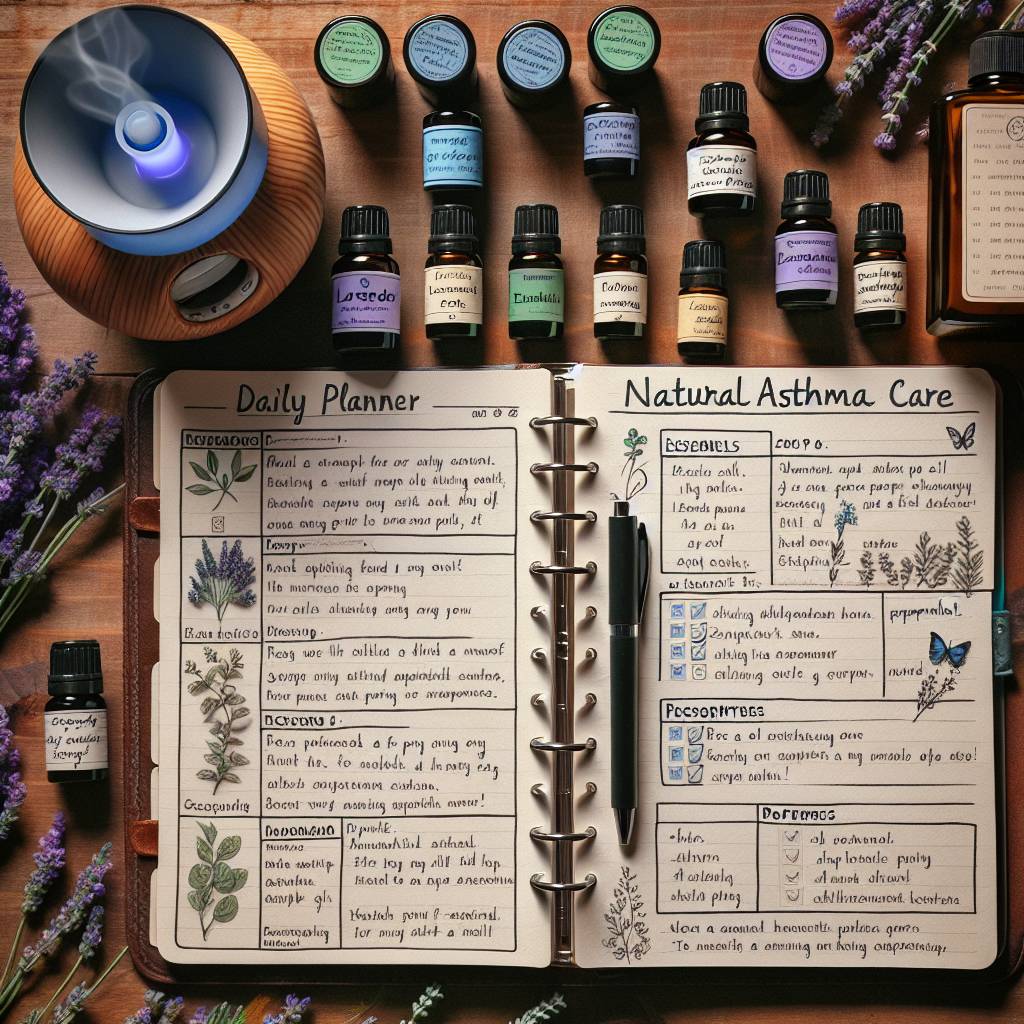Natural asthma care: Integrating essential oils into your routine
To integrate essential oils into your asthma care routine, start by choosing oils known for their respiratory benefits, such as peppermint, eucalyptus, and lavender. Use a diffuser to inhale the oils safely or apply them topically after diluting with a carrier oil to avoid skin irritation. Incorporating these oils into your daily routine can help soothe asthma symptoms and improve breathing. Always consult with a healthcare provider before starting any new treatment.

What Are the Best Essential Oils for Asthma Relief?
When it comes to finding relief from asthma symptoms, many people turn to essential oils as a natural remedy. Peppermint and eucalyptus oils are often cited as the best options for easing breathing difficulties. These oils contain menthol and eucalyptol, respectively, which can help in opening up the airways and reducing congestion.
Lavender oil is another popular choice due to its anti-inflammatory properties. It’s believed to help reduce inflammation in the airways, making it easier for asthma sufferers to breathe. Additionally, ginger oil has been noted for its ability to relax the airway muscles and enhance airflow.
Can Essential Oils Directly Improve Lung Function in Asthma Patients?
The direct impact of essential oils on lung function in asthma patients is a topic of ongoing research. While some anecdotal evidence suggests that essential oils can help improve breathing and reduce symptoms, scientific studies are still needed to confirm these effects. Essential oils may aid in relaxation and stress reduction, indirectly benefiting lung function by alleviating some triggers of asthma attacks.
It’s important to note that while essential oils can complement traditional asthma treatments, they should not replace prescribed medications or therapies. Consulting with a healthcare provider before using essential oils for asthma care is crucial to ensure safety and effectiveness.
Learn the benefits of essential oils for lung improvement. Discover the best oils and safe usage practices.
What Precautions Should Be Taken When Using Essential Oils for Asthma?
Using essential oils for asthma requires careful consideration due to the potential for allergic reactions or irritation. It’s vital to perform a patch test before fully incorporating an essential oil into your routine. This involves applying a small amount of diluted oil to the skin and waiting 24 hours to check for any adverse reactions.
Additionally, diffusing essential oils in the air should be done cautiously. Overuse or exposure in confined spaces can lead to respiratory discomfort or worsen asthma symptoms in some individuals. Starting with low concentrations and ensuring proper ventilation can help minimize risks.
How to Use Essential Oils Safely for Asthma Care?
To use essential oils safely for asthma care, always dilute them with a carrier oil before topical application. Common carrier oils include coconut oil, olive oil, or almond oil. This dilution helps prevent skin irritation or allergic reactions that could trigger an asthma attack.
For inhalation purposes, using an ultrasonic diffuser can disperse fine mist into the air without generating heat or potentially harmful compounds. Limiting diffusion sessions to 30 minutes at a time ensures that you’re not overexposed while still benefiting from the therapeutic properties of the essential oils.
| Essential Oil | Benefits for Asthma | How to Use |
|---|---|---|
| Eucalyptus | Helps to decongest and improve breathing | Inhale directly or add a few drops to a diffuser or hot water for steam inhalation |
| Lavender | Reduces inflammation and relieves stress | Add to a diffuser before sleep or mix with a carrier oil and apply to chest and neck |
| Peppermint | Dilates the bronchial muscles, improving airflow | Inhale directly, diffuse, or apply topically with a carrier oil to the chest |
| Frankincense | Reduces airway inflammation and boosts immunity | Use in a diffuser or mix with a carrier oil for chest rubs |
| Tea Tree Oil | Fights respiratory infections by killing bacteria, viruses, and fungi. | Add a few drops to hot water for steam inhalation or use in a diffuser. |
| Rosemary | Helps in relieving respiratory congestion and allergies. | Mix with a carrier oil for chest rubs or use in a diffuser. |
| Ginger | Aids in reducing inflammation and enhancing immune response. | Mix with hot water for inhalation or blend with carrier oils for topical application. |
Are There Any Scientific Studies Supporting the Use of Essential Oils for Asthma?
Yes, there are scientific studies that suggest essential oils might help with asthma symptoms. Researchers have found that some oils, like peppermint and eucalyptus, can help open up the airways. This makes breathing easier for people with asthma.
However, it’s important to note that these studies are still in the early stages. Scientists are working to understand how these oils work and how much they help. So, while there is some support, more research is needed to know for sure.
How Can Essential Oils Be Integrated into Daily Routines for Asthma Management?
Integrating essential oils into daily routines can be simple and effective. One way is by using a diffuser in your home. This helps spread the scent of the oil through the air, making it easy to breathe in.
Another method is applying diluted essential oils directly to the skin. It’s often done on the chest or back. But remember, it’s crucial to dilute these oils properly to avoid skin irritation. Always check with a healthcare provider before starting any new treatment.
What Are the Potential Side Effects of Using Essential Oils in Asthma Patients?
While essential oils can offer benefits, they also come with potential side effects. Some people might experience allergic reactions or skin irritation from direct contact with these oils. It’s especially true if the oil is not diluted correctly.
Inhaling certain oils might also trigger asthma attacks in some individuals. That’s why it’s vital to start with small amounts and see how your body reacts. Always consult with a doctor before trying new treatments for asthma.
Final Thoughts
In conclusion, while there is some scientific evidence supporting the use of essential oils for asthma relief, more research is needed. These natural remedies can be part of an asthma management plan but should not replace traditional treatments prescribed by a healthcare professional.
If you’re considering using essential oils for asthma, talk to your doctor first. They can help you understand the potential benefits and risks based on your specific health situation. Remember, managing asthma effectively requires a comprehensive approach tailored to your needs.






